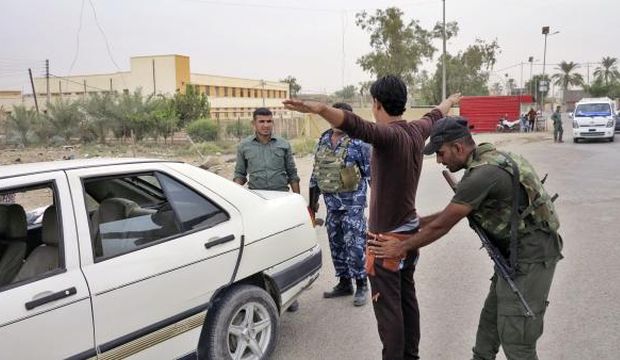
A member of the Iraqi security force searches a man at a checkpoint in Ramadi, on October 12, 2014. (Reuters/Stringer)
Baghdad, Asharq Al-Awsat—Authorities in the Iraqi province of Anbar have declared a total curfew in all public areas in its capital of Ramadi “until further notice,” after the province’s police chief was killed in a bomb attack on Sunday.
An improvised explosive device went off in the Albu Risha area north of Ramadi where commander of the Anbar Police Force, Maj. Gen. Ahmad Al-Dulaimi, was stationed, according to Iraqi News.
Dulaimi, a former member of the Iraqi army, was appointed to the job on July 26, and was approved by Anbar’s tribal leaders. His predecessor, Maj. Gen. Ismail Al-Mahalawi, was removed following criticisms of his failure to prevent ISIS’s lightning advance across the province in June, with several reports of police personnel abandoning their posts in areas ISIS was targeting.
Rashid Fleih, the head of the Iraqi army in Anbar, promised on Sunday to avenge Dulaimi’s death with a military operation in the province “involving tribal forces, [international anti-ISIS] coalition warplanes, in addition to the forces belonging to the Anbar Operations Council,” he said.
However, speaking to Asharq Al-Awsat, Mohamed Al-Hayis, the head of the Sons of Iraq, a coalition of Anbar tribal forces, denied Anbar’s tribes would take part in such an operation.
“All this talk of beginning military operations after the killing of the Anbar police chief is just not logical,” he said. “Operations here should have started long before this [killing happened], not to prevent the killing of Maj. Gen. Ahmad Al-Dulaimi, but to prevent the fall of Fallujah . . . and other areas in Anbar to ISIS,” he said.
No-one has yet taken responsibility for the attack, but Hayis was adamant it was ISIS that had killed Dulaimi, “because he was one of the fiercest of those fighting against ISIS . . . and Al-Qaeda before it.”
He added: “It was for this reason that he became a number-one target for all these armed groups in the area.”
Speaking of ongoing operations against ISIS, Hayis said they were not enough to stop the advance of the extremist group: “These military operations did not meet what was expected throughout the [Anbar] province. This is what allowed ISIS to advance in different areas [here]. What is needed now is to strengthen those forces already present by intensifying the aerial bombardment, which we have noticed has diminished in recent days.”
Anbar Provincial Council member Adhal Al-Fahdawi also echoed sentiments that more help was needed by Anbar from coalition forces. He told Asharq Al-Awsat: “The Anbar tribes have previously requested full support to enable them to fight ISIS, but the support remains insufficient. As such, the Anbar Provincial Council and the Anbar tribes which support it were forced to request the presence of foreign ground forces in order to free the province from ISIS’s grasp.”
In contrast to Hayis, Fahdawi said fighters from Anbar’s tribes would participate in an operation in response to Dulaimi’s death, which he said would mark a “new phase that will push the Anbar tribes to come together as they did during 2006 and 2007 when they routed Al-Qaeda from the province, which we will achieve again [with ISIS] with the support of all.”
Meanwhile, Iraqi army sources, speaking to Asharq Al-Awsat on condition of anonymity, denied reports that ISIS fighters were closing in on the Iraqi capital, with some claiming the extremist group was less than 10 miles (16 kilometers) away from Baghdad.
“The military presence around Baghdad is holding things together pretty well, to the extent that I can say, especially after freeing the area of Sadr Al-Yusufiya northwest of Baghdad . . . one of the most important ISIS strongholds in the area, that today we have even begun to return some refugees [in the area] back to their homes,” the source said.
“Every military leader I speak to talks of how capable they are of defending the areas under their control, just at the same time that we are hearing that battles are taking place here and there and that . . . [the Iraqi army is] fleeing. But for us, I can say that our military situation is very good indeed, whether you’re looking at the Iraqi army or the local popular and volunteer forces.”
Iyad Al-Jabouri, the leader of a coalition of tribes from the Baghdad Belt region surrounding the capital, told Asharq Al-Awsat the situation in these areas was “good” and that coordination was currently ongoing between the army, tribal fighters and other volunteer militias around these areas, “which are safe and where you will find that the streets are safe.”

Trackbacks/Pingbacks